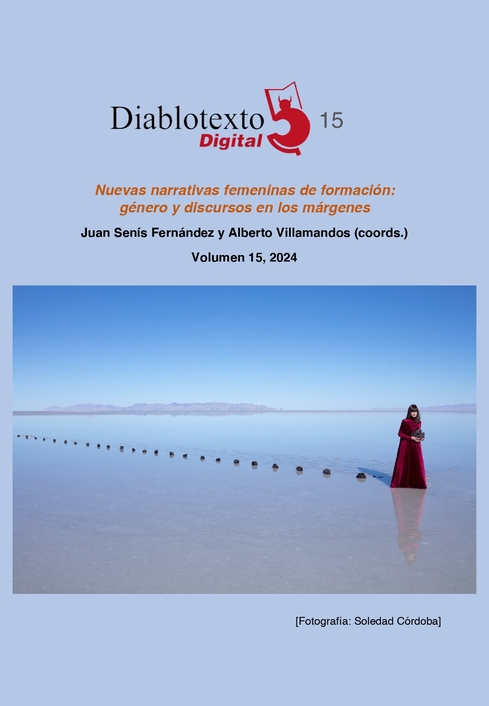Precarity, urban spaces, and illness: 2008 economic crisis effects in La trabajadora by Elvira Navarro
DOI:
https://doi.org/10.7203/diablotexto.15.27738Keywords:
precariat, economic crisis, urban spaces, illness, performance society Abstract
Abstract
Elvira Navarro's La trabajadora presents the effects of the 2008 economic crisis on Spanish society, especially women. In this article, I argue that the characters in the novel belong to a new social class that some theorists call the precariat. Likewise, as biopolitical subjects and part of a performance society, they suffer firsthand the consequences of neoliberal practices: the gentrification of the city and the creation of sick subjects faced with an uncertain work future. Because of this, the female characters succumb to the neoliberal system, thus perpetuating their precarious lives.
 Downloads
Downloads
 References
References
Alonso, Luis Enrique, et al. (2016). “Entre la austeridad y el malestar: discursos sobre consumo y crisis económica en España”, Reis (2016), nº 155, pp. 21-36.
Alonso, Luis Enrique, et al. (2017). “Juventud y percepciones de la crisis: precarización, clases medias y nueva política”, EMPIRIA (2017), nº 37, pp. 155-178.
Becerra Mayor, David (2014). “Las enfermedades psíquicas que el capitalismo provoca”, Mundo Obrero (Abril 2014) nº 271, p. 27.
De Certeau, Michel (2000). La invención de lo cotidiano: I. Artes de hacer. Trad. Alejandro Pescador. México D.F.: Universidad Iberoamericana.
Delgado Ruiz, Manuel (2017). “Introducción” En Henri Lefevre, El derecho a la ciudad. Madrid, Capitán Swing, pp. 15-19.
Foti, Alex (2017). General Theory of the Precariat: Great Recession, Revolution, Reaction. Amsterdam: Institute of Network Cultures.
García, Noelia (2016). “La desaparición del exterior en La trabajadora de Elvira Navarro”, LL Journal (2016), nº 11, pp. 1-15.
Han, Byung-Chul (2022). La sociedad del cansancio. Trad. Arantzazu Saratxaga Arregi y Alberto Ciria. Barcelona: Herder Editorial.
Harvey, Henry (2013). Ciudades rebeldes: Del derecho a la ciudad a la revolución urbana. Trad. Juanmari Madariaga. Madrid: Akal.
Janoschka, Michael (2011). “Geografías urbanas en la era del neoliberalismo. Una conceptualización de la resistencia local a través de la participación y la ciudadanía urbana”, Investigaciones Geográficas (2011) nº 76, pp. 118-132.
Johannessen, Jon-Arild (2019). The Workplace of the Future: The Fourth Industrial Revolution, the Precariat, and the Death of Hierarchies. Nueva York: Routledge.
Johnson, Matthew, ed. (2015). Precariat: Labour, Work and Politics. Nueva York: Routledge.
Labrador Méndez, Germán (2012). “Las vidas subprime: La circulación de historias de vida como tecnología de imaginación política en la crisis española (2007-2012)”, Hispanic Review (2012) vol. 80, nº 4, pp. 557-581.
Lefebvre, Henri (2017). El derecho a la ciudad. Trad. Ion Martínez Lora y José González Pueyo. Madrid: Capitán Swing.
Martínez Rubio, José (2016). “Precariedad, subjetividad y trauma en la novela de la crisis: desorden psíquico y enfermedad social en La trabajadora de Elvira Navarro”, Ressegna iberística (2016) nº 39, pp. 289-306.
Mateos, Araceli; Penadés, Alberto (2013). “España: Crisis y recortes”, Revista de ciencias políticas (2013) vol. 33, nº 1, pp. 161-183.
Navarro, Elvira (2014). La trabajadora. Barcelona: Literatura Random House.
Potok, Magda (2022). “Pensar a través de la ciudad: La trabajadora de Elvira Navarro y Lectura fácil de Cristina Morales”, Studia Romanica Posnaniensia (2022) nº 49, pp. 53-66.
Prudant, Sergio (2015). “Biopolítica del desarrollo y salud mental”, Psiquiatría Universitaria (2015) nº 11, pp. 28-37.
Ramos, María (2016). “Sobrecualificación y desempleo juvenil. Dinámicas de inserción laboral de los titulados universitarios”, Disponible en <https://observatoriosociallacaixa.org/-/sobrecualificacion-y-desempleo-juvenil-dinamicas-de-insercion-laboral-de-los-titulados-universitarios> [Fecha de consulta: 20 de mayo de 2028].
Ruiz Flores, Mariana (2022). “Los efectos de la precariedad en la ciudad neoliberal: El trastorno mental en La trabajadora (2014) de Elvira Navarro”, AMOXCALLI (2022) vol. 5, nº 9, pp. 44-64.
San Martín, Olga (2017). “El número de suicidios crece un 20% desde el inicio de la crisis económica”, Disponible en <https://intersindicalaragon.org/archivos/8562> [Fecha de consulta: 21 de mayo de 2018].
Standing, Guy (2013). Precariado: una nueva clase social. Trad. Juanmari Madariaga. Barcelona: Ediciones Pasado y Presente.
Standing, Guy (2014). Precariado: una carta de derechos. Trad. Andrés de Francisco. Madrid: Capitán Swing.
Downloads
Published
How to Cite
-
Abstract101
-
PDF (Español)45
Issue
Section
License
Licencia de reconocimiento de Creative Commons “Reconocimiento - No Comercia l- Sin Obra Derivada
Authors who publish with this journal agree to the following items:
The authors will keep their copyright and guarantee the journal the right of first publication of their work, which will be simultaneously subject to the Creative Commons license that allows third parties to share the work indicating its author and its first publication in the journal. The authors may adopt other non-exclusive license agreements to distribute the version of the published work (e.g., depositing it in an institutional telematic file or publishing it in a monographic volume), with an acknowledgment of its initial publication in this journal. The authors are allowed and encouraged to disseminate their work through the Internet (e.g., in institutional telematic archives or on their website) before and during the submission process, which can produce interesting exchanges and increase citations of the published work. (See Effect of Open Access)




